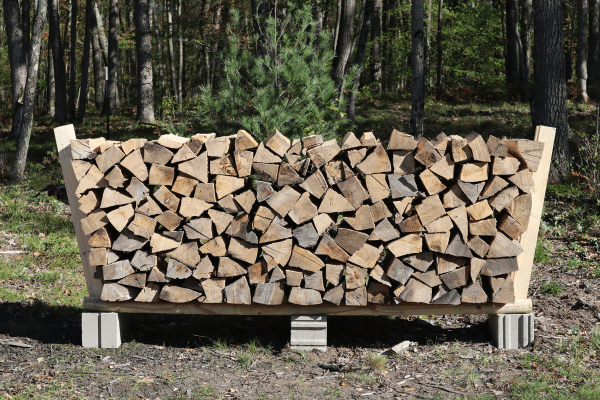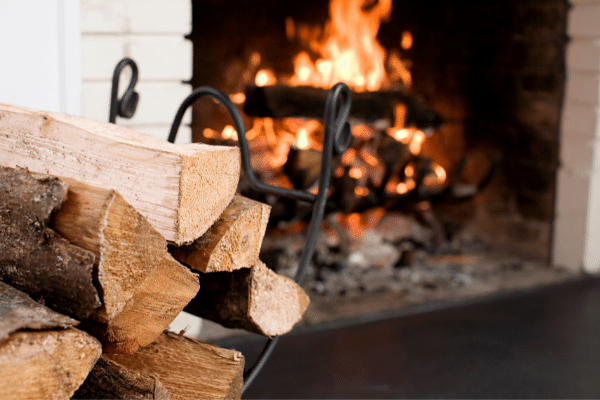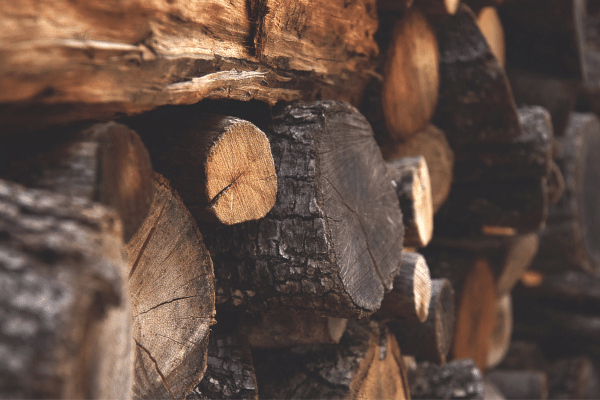- Home
- Types Of Firewood
- Is Pecan Good Firewood
Is Pecan Good Firewood?
This post may contain affiliate links so I earn a commission.
Is pecan good firewood, or are there better options out there for you to choose from?
Ask anyone who heats with wood, and they will tell you that pecan makes excellent firewood.
As we will see, it checks many of the boxes for desired firewood traits, but it is interesting to note that firewood is not the primary usage of pecan.
The trees are, in fact, most sought after for their seeds, the pecan.
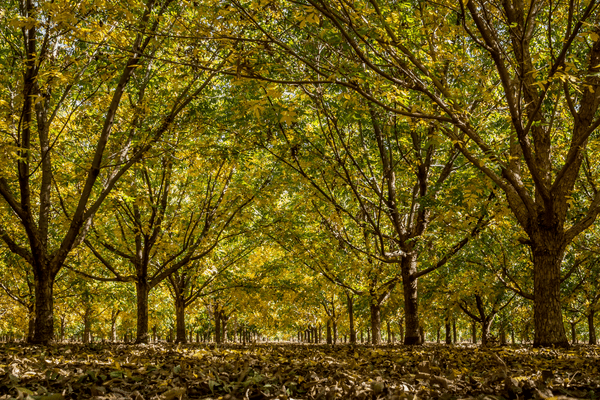
Yes, the same nut that your grandmother bakes into delicious pies.
Truly, the pecan is a tree that keeps on giving.
Let’s look at the traits of this tree and answer the question.......is pecan good firewood?
Pecan Trees
Although there are more than 500 varieties of pecan trees found all over the world, people in the U.S. are most familiar with the Carya illinoinensis, or common pecan.
This hardwood tree, the largest member of the hickory family, can be found all across North America.
The pecan nuts – well, technically they are "drupes," the single pit found inside a fruit – have been used as a food source by the indigenous people of the continent long before European settlers arrived.
And it remains a culinary favorite.
In fact, pecan trees are grown and cultivated like other types of fruit bearing trees.
The deciduous pecan trees can grow as tall as 130 feet with a trunk circumference of more than six and a half feet.
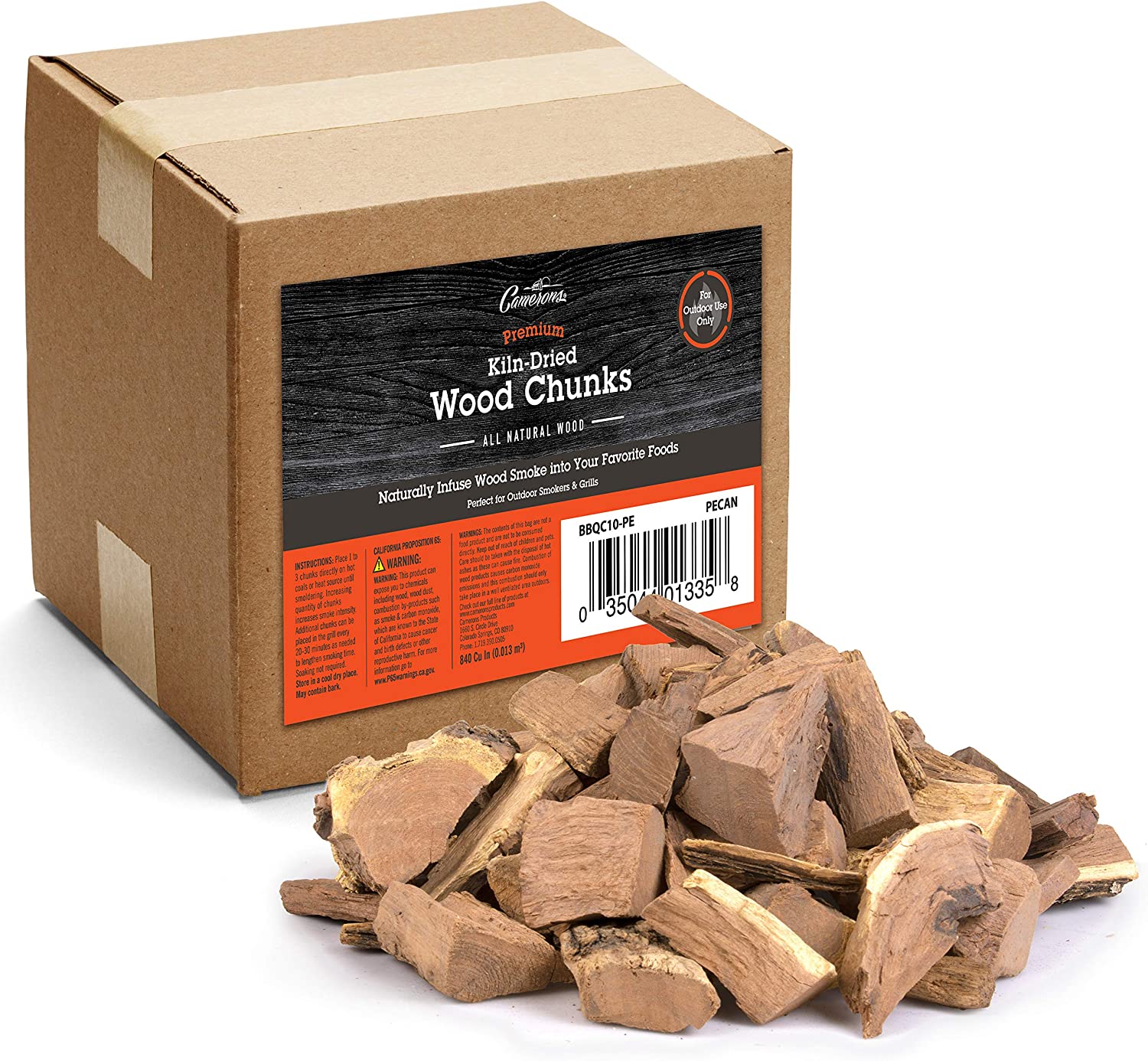
All Natural Pecan BBQ Smoker Chunks
The tree has a large canopy spreading to as
much as 75 feet.
The wood of the pecan tree is commonly used in furniture making and for wooden flooring.
In recent years, folks who love grilling and smoking their meat have rediscovered pecan as flavoring fuel.
Pecan wood gives meat a nutty flavor with a hint of sweetness.
Is Pecan Good Firewood To Burn?
Pecan wood is a great source of firewood with many of the same qualities as hickory firewood, including a high BTU rating, low smoke output, and ease of splitting.
Let’s see how pecan firewood stacks up.
BTU Rating
The British Thermal Unit, or BTU, is the scale that measures heat output.
Basically, it is the amount of heat needed to increase the temperature of one pound of water by one degree Fahrenheit.
Pecan firewood has a BTU rating of 28 million BTUs per cord of wood which is comparable to white oak, beech, and black locust, but not as high as Osage orange.
Pecan firewood outranks chestnut, aspen, and even hickory.
For a homeowner heating with firewood, pecan offers more bang for the buck.
A pecan fire will burn hotter and longer than many other firewood choices.
Coal Production
Some firewood varieties burn quickly into a pile of ashes, but pecan produces a nice bed of coals.
In fact, pecan is a better coal producer than oak and black locust.
The coals radiate heat for hours, giving your fire longevity.…just what you need so you can sleep through the night without having to set your alarm to stoke the fire.
You will probably wake in the morning to glowing coals that will make restarting your fire quick and easy.
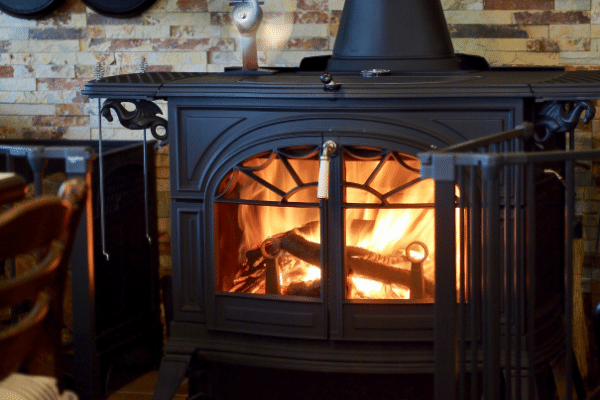
Smoke Production
When thoroughly seasoned, pecan firewood produces very little smoke, unlike other firewood varieties like aspen and pine.
If you have a family member with asthma or who is sensitive to smoke, pecan is an excellent choice.
The pecan wood should be well seasoned.
Green wood will produce more smoke because of the high moisture content of the wood.
Because it is a dense wood, pecan requires a seasoning time of between 12 and 18 months.
You can periodically test its readiness with a moisture meter.
Sparking And Popping
The popping, crackling, and sparking you hear and see when wood is burned is the result of sap and water trapped in the wood’s cellular makeup that expand when heated to explode out of their cellulose pockets.
It can be problematic when the pops send sparks flying, especially if the fire is in an open fireplace or campfire.
With pecan firewood, you really don’t have much to worry about in this regard.
The density of the wood and its low sap content means that pecan produces very little sparks and pops.
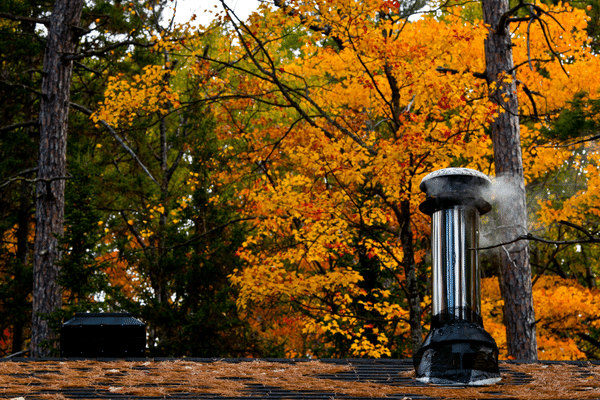
Creosote
Output
As the last section explained, pecan is naturally low in sap and resin.
This translated to a low creosote output.
For homeowners who heat with wood, creosote buildup is often a concern.
The sticky, black, tar-like substance can collect in chimneys and block airflow, which is why it is important to have your chimney regularly cleaned and inspected.
The low sap content in pecan, however, makes it one of the better woods to burn because it produces very little creosote residue.
Smell
When burned, pecan gives off a pleasant aroma that is slightly sweet and fragrant.
While some other firewoods can be quite stinky and overpowering, pecan’s smell is light and cozy.
The flavor of the smoke makes pecan one of the favored seasoning woods for meat smokers and grillers
Is Pecan Good Firewood To Split?
Although pecan wood is dense and heavy, it has a straight grain which makes it easy to split the unseasoned wood.
It can be split using a maul or splitting axe without too much effort if you don’t have a log splitter.
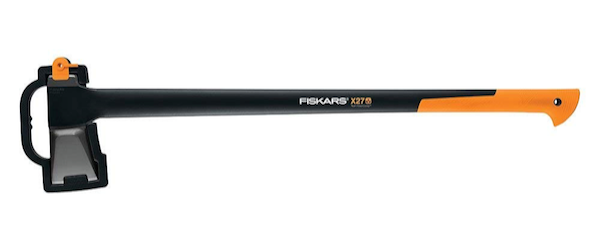
A word of caution though......pecan wood becomes
harder to split as it seasons.
Completely dry and seasoned pecan is much tougher to split so be sure you do your splitting when you cut and stack your firewood.
The wood will dry out quicker and you won’t break your back trying to split it.
Is Pecan Good Firewood - Overall
The answer to this question is a resounding “Yes!”
Pecan firewood is dense and heavy with an impressively high BTU rating.
It produces very little smoke, sparks, and creosote residue.
What it does produce is a pleasant aroma and a long-lasting bed of hot coals.
Toss a few logs of pecan wood into your fireplace, cut a slice of pecan pie, and relax in warmth and comfort.
